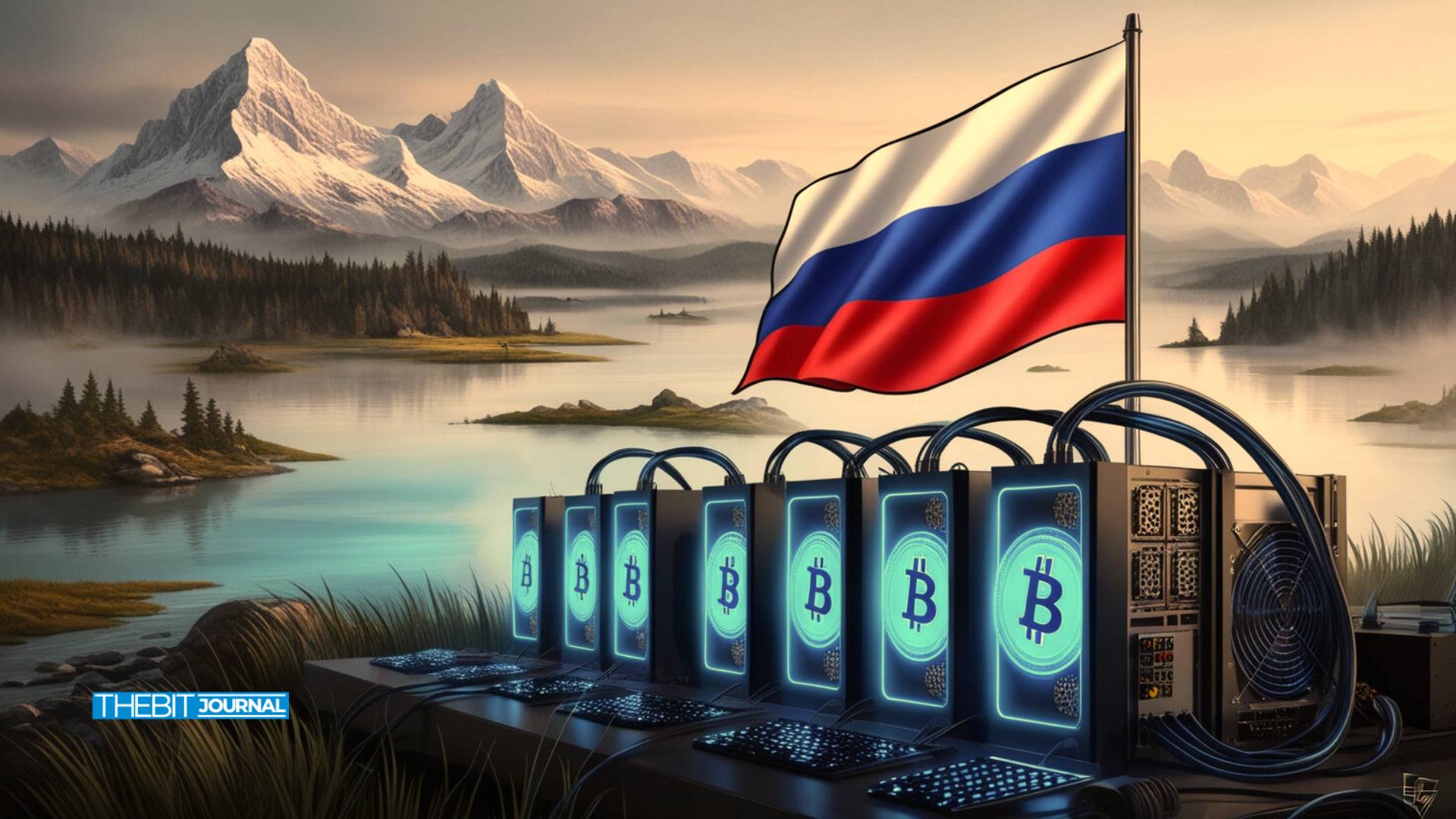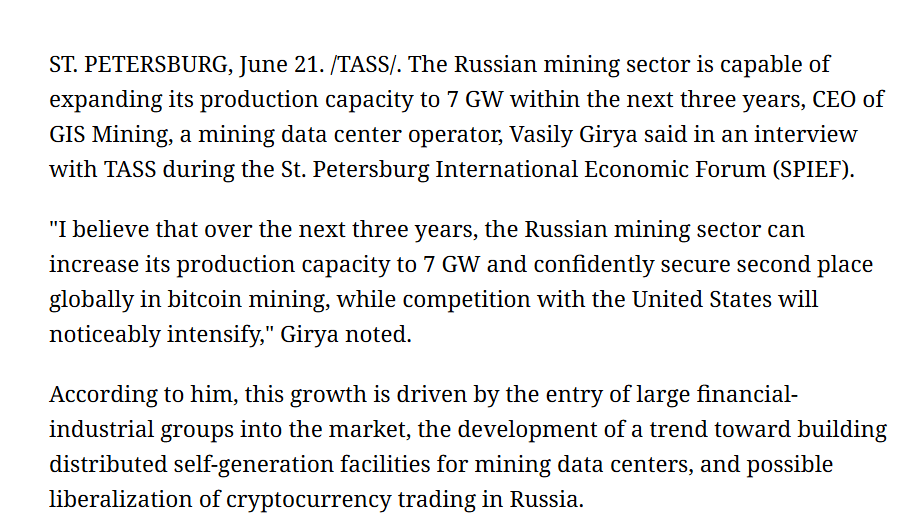Russia vs. U.S.: How The Race to Rule Bitcoin Mining Is Heating Up
0
0

Over the past few years, Bitcoin has evolved from a niche to mainstream. With more nations and sectors, are into Crypto, especially Bitcoin. Russia is now coming on in a major way, aiming to become the world’s second-largest Bitcoin mining center.
But what exactly does that mean, and where does it play into the larger story of international crypto adoption?
Russia’s Interest in Mining
Russia Bitcoin mining, At the St. Petersburg International Economic Forum, GIS Mining CEO Vasily Girya made a prediction: Russia is likely to install 7 gigawatts (GW) of Bitcoin mining power within three years. If it does, Russia Bitcoin mining would rank second only behind the U.S. in Bitcoin hashrate, the processing power devoted to securing the Bitcoin network and validating transactions.

Girya cited Siberia’s energy surplus, low temperatures, and fresh investments by major industrial players as main reasons the country is poised to expand its mining activities.
Despite the optimism, as many as 30% of Russia’s Bitcoin miners are officially registered with the nation’s tax authorities. This translates into most of the industry still working closely, avoiding official benefits, and depriving the government of potential tax dollars.
As is known, Russia has declared a cryptocurrency mining ban in parts of the country over winter to avoid power shortages. The ban will run from December 1, 2024, to March 15, 2025, in regions such as Irkutsk, Buryatia, Zabaikalsky, Chechnya, Dagestan, and occupied Ukraine. In other areas, such as the North Caucasus and occupied Ukraine, the ban will remain seasonal until 2031.
The move follows recently enacted laws that were signed off by President Putin on November 1 for the regulation of crypto mining and enabling cross-border payments for crypto. Although crypto is not yet permitted for everyday use within Russia, officials believe these new regulations may assist the country in managing foreign sanctions.
Nevertheless, Russia appears ready to formalize the industry further. Even President Putin recognized in 2024 that Russia Bitcoin mining was a valuable economic prospect, particularly in areas such as Siberia where there is abundant cheap energy and trained labor.
How This Relates to Global Bitcoin Adoption
Russia is not alone. Across the globe, nations are starting to see Bitcoin in a different light. Some continue to concentrate on regulation or risk, but others are embracing the technology. Here’s the way that global Bitcoin adoption is trending:
Nations are coming to understand that Bitcoin is not merely a speculative investment. It’s becoming an instrument of financial inclusion, sovereign wealth, and technological advancement.
- El Salvador hit the headlines in 2021 by making Bitcoin legal tender. Now, it’s constructing a “Bitcoin City” fueled by volcano power.
- The U.S. is still the leading mining nation in terms of hashrate, with large entities establishing mining farms in Texas and Wyoming.
- Brazil and Argentina are experiencing increasing use through inflation and volatile currencies.
- In Africa, particularly Nigeria and Kenya, Bitcoin is being utilized as a digital savings account and payment option.
Energy is needed for Russia Bitcoin mining and plenty of it. That’s the reason why places like Siberia are attracting notice. The frigid environment minimizes cooling system needs, and access to cheap energy keeps miners in the black.
Russia’s strength is in its excess infrastructure and power, especially in under-developed regions. But with that comes a responsibility: balancing mining requirements with the needs of local energy and keeping the industry expanding in legal and environmental limits.
Russia’s desire to be a world mining leader might energize its role in the digital economy, particularly as conventional financial systems modernize. As more nations gradually see the merits of blockchain and decentralized finance, the role of Bitcoin is growing.
If Russia manages to incorporate large-scale mining with enhanced regulation, it may lead by example: how a nation can utilize country resources to harness a digital future.
Meanwhile, the global Bitcoin network continues to strengthen as more nations are involved. Be it through mining, legal structures, or practical use cases, Bitcoin is increasingly becoming a part of the world economic narrative.
Can Russia Bitcoin Mining Outpace the U.S. in Bitcoin Adoption?
Currently, the U.S. leads in Bitcoin adoption due to having more businesses employing it, improved legislation, and potential such as Bitcoin ETFs that make people invest. Russia Bitcoin mining is also rapidly growing in mining, particularly with its low-priced energy and backing by large investors. However, mining doesn’t matter for a country to outpace others in adoption.
In order to catch up with or surpass the U.S., Russia would require more individuals actually utilising Bitcoin, transparent regulations, and improved accessibility to the general public. It may happen but for the time being, the U.S. is still ahead in terms of applying Bitcoin in everyday life and commerce.
Russia Bitcoin mining growth isn’t just about electricity and machines—it’s about where Bitcoin fits into a changing world. As the global economy becomes more digital, and as countries seek alternatives to traditional finance, Bitcoin continues to offer something unique.
FAQs:
- Why is Russia interested in Bitcoin mining?
Russia is endowed with cheap energy, particularly in areas such as Siberia. It is thus suitable for Russia Bitcoin mining, which needs plenty of power. Authorities think that it can enable the nation to develop economically and evade some foreign sanctions.
- Will Russia totally prohibit Bitcoin mining in certain regions?
Yes, from December 1, 2024, mining will be prohibited during the winter months in some areas to prevent power shortages. Annual seasonal prohibitions will happen in some areas until 2031.
- Can Russia surpass the U.S. in Bitcoin mining or adoption?
Russia can get close to adopting it in mining thanks to its energy strengths, but to full adoption—such as daily usage, integration by businesses, and legal certainty—the U.S. is still ahead. Russia would require additional public use and clear laws to get closer.
Glossary
- Bitcoin Hashrate
The aggregate processing power employed by miners to authenticate transactions and lock down the Bitcoin network. The greater hashrate, the stronger the network security.
- Crypto Mining Ban
A government limit which curbs or halts cryptocurrency mining, often because of energy issues, since mining requires a lot of electricity.
- Cross-Border Crypto Payments
Payments made using cryptocurrency between individuals or entities in two countries. They may be used to circumvent traditional banking channels or sanctions.
- Legal Tender
Money that is required to be accepted when tendered in settlement of a debt. El Salvador, for instance, legalized Bitcoin as legal tender in 2021.
Sources
Read More: Russia vs. U.S.: How The Race to Rule Bitcoin Mining Is Heating Up">Russia vs. U.S.: How The Race to Rule Bitcoin Mining Is Heating Up
0
0
 Manage all your crypto, NFT and DeFi from one place
Manage all your crypto, NFT and DeFi from one placeSecurely connect the portfolio you’re using to start.





